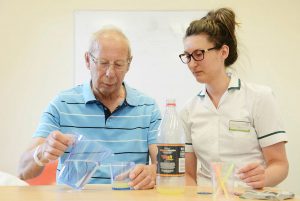Would you like to become an Occupational Therapist?
Occupational therapy (OT) is a science degree-based, health and social care profession, regulated by the Health and Care Professions Council. Occupational therapy takes a “whole-person approach” to both mental and physical health and wellbeing and enables individuals to achieve their full potential.
Occupational therapy provides practical support to empower people to facilitate recovery and overcome barriers preventing them from doing the activities (or occupations) that matter to them. This support increases people’s independence and satisfaction in all aspects of life.
“Occupation” as a term refers to practical and purposeful activities that allow people to live independently and have a sense of identity. This could be essential day-to-day tasks such as self-care, work or leisure.
Think about your day-to-day life; would you be able to cope or live fully if you didn’t have access to the internet? Or couldn’t get out of bed in the morning?
Occupational therapists work with adults and children of all ages with a wide range of conditions; most commonly those who have difficulties due to a mental health illness, physical or learning disabilities. They can work in a variety of settings including health organisations, social care services, housing, education, voluntary organisations or as independent practitioners.
What does an occupational therapist do?

An occupational therapists job role is to help people of all ages overcome the effects of disability caused by illness, ageing or accident so that they can carry out everyday tasks or occupations.
An occupational therapist will consider all of the patient’s needs – physical, psychological, social and environmental. This support can make a real difference giving people a renewed sense of purpose, opening up new horizons, and changing the way they feel about the future.
An occupational therapist’s skills lend themselves to new emerging roles, such as working with asylum seekers or refugees, working alongside police or fire services, or liaising with psychiatric services.
 In this section
In this section